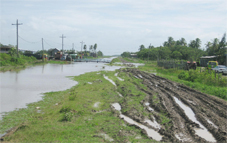Farmers across the Pomeroon struggled to cope as waters continued to rise in the river and inundated farmlands yesterday.
Floodwaters have been affecting the area since last Sunday and up to late yesterday showed no signs of abating as rains continued. Various sections along the river have been flooded by varying depths of water. “I just praying and hoping God give me faith,” said Dawn Young who farms at Martindale in the lower Pomeroon.
Minister of Agriculture, Dr Leslie Ramsammy, told Stabroek News that there is about a foot to two feet of water in some areas. Mainly cash crops were destroyed and junior Agriculture Minister Ally Baksh and Minister of Health, Dr Bheri Ramsaran, are part of a team that has been in the area for several days, he said. Ramsammy is awaiting a report from Baksh about the situation but noted that it is mostly the farmlands that have been affected.

Young is one of those who is severely affected. “Everything in the backdam already gone. I don’t know what to do. A lot of things I already lost,” the woman told Stabroek News yesterday. “All me ground provision gone,” she said, despair in her voice as she lamented the loss of cassava and other crops, including plantains and bananas that were bearing fruit but have since collapsed. “The water rising,” she said. “The rain keep falling and the water keep rising.”
Young said she invested $1 million last year to ensure proper drainage for her land and it has all come to naught. “When I go down to the backdam, I can’t bear it,” she said noting that the cassava has already gone and the avocado plants are drowning. “It ain mek no sense ’cause I losing double ’cause now when I suppose to start reaping to make back the money, it going down the drain again.”
The woman said that Agriculture Ministry officials visited on Thursday and promised two drums of diesel to clean the canal near her home. The excavator operator is charging $1,500 per rod to clean the canal and she has calculated that it will cost $300,000 in total. “It very hard on me to find that money. I keep studying what to do,” Young said. She said that the diesel will alleviate this somewhat but the cost is still high.
Young noted that water is coming onto her land from the river and savannah and the lower flat of her home is flooded. “The whole downstairs is sheer water,” she said, while lamenting that some household items were damaged.
Young said that if the mouth of the Pomeroon River is dredged it would be beneficial to all farmers since the water would flow out
unimpeded. At present, she said, “the river ain drawing so the water keep coming up.”
‘Serious’
In Unity, Lower Pomeroon, Wendell Daniels said that since Monday he has spent $50,000 per day to keep three pumps running to drain his land. His efforts were successful and he is coping but he stressed the seriousness of the situation. “It is serious,” he said. “Water [is] knee deep in some people estate and the water is not going down.”
Daniels, who operates a large farm, said that he is the only one who has pumps to drain water. But, he noted, the water is not going down and keeps rising. “The koker ain drawing at all,” he said. “From since Sunday, the water ain drawing at all. It just keep building up all the time.”
The farmer said that water is being released from the Dawa pump station into the Pomeroon River and this is contributing to the flooding. It was raining since December but there was no flooding but he said when the heavy rains began, the excess water is being “pumped” into the Pomeroon. Usually, he added, the water would go down for six hours and then rise as the tide rose but for the past week, it has not been happening at all and the water keeps rising.
“It is serious. After this here, I don’t think people will have anything to sell,” he said. “All them cash crops, all finish already.”
Daniels said that farmers want duty-free pumps and fuel so that they can try to save their crops.
In Marlborough, Rosamund Benn said that she had lost boloungers, okra, squash, tomatoes and plantains, among other crops. She normally plants a three-acre plot and the majority has been lost. “We have had water from since Sunday until now,” she told Stabroek News yesterday. She said that plantains that were bearing were falling down. The water is ten inches on her land and she said it is the biggest flood she has seen since 2005/2006. “The water isn’t coming off at all,” she noted, adding, “The river is choked.” Benn explained that the water is not leaving the land when the tide falls and said that the opening of new lands in the upper Pomeroon and the releasing of water through the Dawa station is contributing to the flooding.





